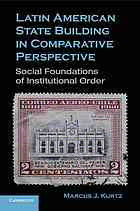
Latin American State Building in Comparative Perspective : Social Foundations of Institutional Order PDF
Preview Latin American State Building in Comparative Perspective : Social Foundations of Institutional Order
LatinAmericanStateBuildinginComparativePerspective SocialFoundationsofInstitutionalOrder LatinAmericanStateBuildinginComparativePerspectiveprovidesan accountoflong-runinstitutionaldevelopmentinLatinAmerica,which emphasizes the social and political foundations of state-building pro- cesses. The study argues that societal dynamics have path-dependent consequences at two critical points: at the initial consolidation of nationalinstitutionsinthewakeofindependenceandatthetimewhen the“socialquestion”ofmasspoliticalincorporationforceditswayinto thenationalpoliticalagendaacrosstheregionduringtheGreatDepres- sion. Dynamics set into motion at these points in time have produced widelyvaryingandstabledistributionsofstatecapacityintheregion. Marcus J. Kurtz tests this argument using structured comparisons of thepostindependencepoliticaldevelopmentofChile,Peru,Argentina, andUruguay. MarcusJ.KurtzisanAssociateProfessorintheDepartmentofPolitical Science at Ohio State University. He is the author of Free Market Democracy and the Chilean and Mexican Countryside (Cambridge, 2004).HehashadarticlespublishedintheAmericanJournalofPolit- icalScience,WorldPolitics,ComparativePolitics,ComparativePoliti- calStudies,InternationalOrganization,JournalofPolitics,Politics& Society, Comparative Studies in Society and History, and Theory and Society. Latin American State Building in Comparative Perspective Social Foundations of Institutional Order MARCUS J. KURTZ OhioStateUniversity cambridgeuniversitypress Cambridge,NewYork,Melbourne,Madrid,CapeTown, Singapore,Sa˜oPaulo,Delhi,MexicoCity CambridgeUniversityPress 32AvenueoftheAmericas,NewYork,ny10013-2473,usa www.cambridge.org Informationonthistitle:www.cambridge.org/9780521747318 (cid:2)C MarcusJ.Kurtz2013 Thispublicationisincopyright.Subjecttostatutoryexception andtotheprovisionsofrelevantcollectivelicensingagreements, noreproductionofanypartmaytakeplacewithoutthewritten permissionofCambridgeUniversityPress. Firstpublished2013 PrintedintheUnitedStatesofAmerica AcatalogrecordforthispublicationisavailablefromtheBritishLibrary. LibraryofCongressCataloginginPublicationData Kurtz,MarcusJ. LatinAmericanstatebuildingincomparativeperspective:socialfoundationsofinstitutional order/MarcusJ.Kurtz. p. cm. Includesbibliographicalreferencesandindex. isbn978-0-521-76644-9(hardback)–isbn978-0-521-74731-8(paperback) 1.LatinAmerica–Politicsandgovernment. 2.Nation-building–LatinAmerica–History. 3.LatinAmerica–Socialconditions. I.Title. jl966.k87 2012 320.98–dc23 2012028450 isbn978-0-521-76644-9Hardback isbn978-0-521-74731-8Paperback CambridgeUniversityPresshasnoresponsibilityforthepersistenceoraccuracyofurlsfor externalorthird-partyInternetWebsitesreferredtointhispublicationanddoesnotguarantee thatanycontentonsuchWebsitesis,orwillremain,accurateorappropriate. For Sarah, Chloe¨, and Anneliese Contents Acknowledgments pageix 1 TheDifficultiesofStudyingStateBuilding 1 2 TheSocialFoundationsofStateBuildingintheContemporary Era 18 3 StateFormationinChileandPeru:InstitutionBuildingand AtrophyinUnlikelySettings 66 4 StateFormationinArgentinaandUruguay:Agrarian Capitalism,EliteConflict,andtheConstructionofCooperation 95 5 DivergenceReinforced:TheTimingofPoliticalInclusionand StateStrengthinChileandPeru 131 6 TheSocialQuestionandtheState:MassMobilization,Suffrage, andInstitutionalDevelopmentinArgentinaandUruguay 176 7 Conclusions,Implications,andExtensions:SocialFoundations, Germany–Prussia,andtheLimitsofContemporaryState Building 227 References 251 Index 271 vii Acknowledgments SomeportionsofChapters2and3havebeenadaptedfrom“TheSocialFoun- dations of Institutional Order: Reconsidering War and the ‘Resource Curse’ in Third World State Building.” The final, definitive version of this paper has beenpublishedinPolitics&Society,Vol.37:4(2009):479–520.Copyright(cid:2)C SAGEPublicationsInc.Allrightsreserved. Ibegintheseacknowledgmentswheremyentryintothesocialsciencesbegan – working with David and Ruth Collier decades ago at Berkeley. From them I learned the importance of history, an openness to the possibility of long- termpathdependencies,andthecentralityofresearchdesigntoanysuccessful social-scientificscholarlyendeavor.Whereasthisbook,unlikemylast,wasnot conceived under their guidance, I hope that their influence shows across its breadth. Ofcourse,inthewritingofanybooktherearealwaysmyriaddebts–intel- lectual, personal, and professional – that are accrued. This book is no excep- tion.Manyoftheideasthatultimatelyworkedtheirwayintothismanuscript emerged in conversations, often in unrelated contexts over unrelated mat- ters, over the course of several years. Ken Dubin, Sebastia´n Etchemendy, Ken Greene,VictoriaHui,PaulineJonesLuong,VickyMurillo,MichaelRoss,and Aaron Schneider all provoked insights or changes in my thinking during the development of this book. They may not see their influence in the pages, but the book is stronger for the intellectual conversations that I have had with them.KurtWeylandandtheComparativePoliticsWorkshopattheUniversity ofTexas,Austin,gavemeveryimportantadviceontheargumentandframing ofthefirsthalfofthisbook,asdidtheeditorialcollectiveatPolitics&Society, which was generous enough to publish a preliminary version of the book’s argument with respect to Chile and Peru. Scholarly works are always made stronger through the mechanism of debate and constructive disagreement. I am delighted to have been able to trade ideas back and forth with both Ryan ix
